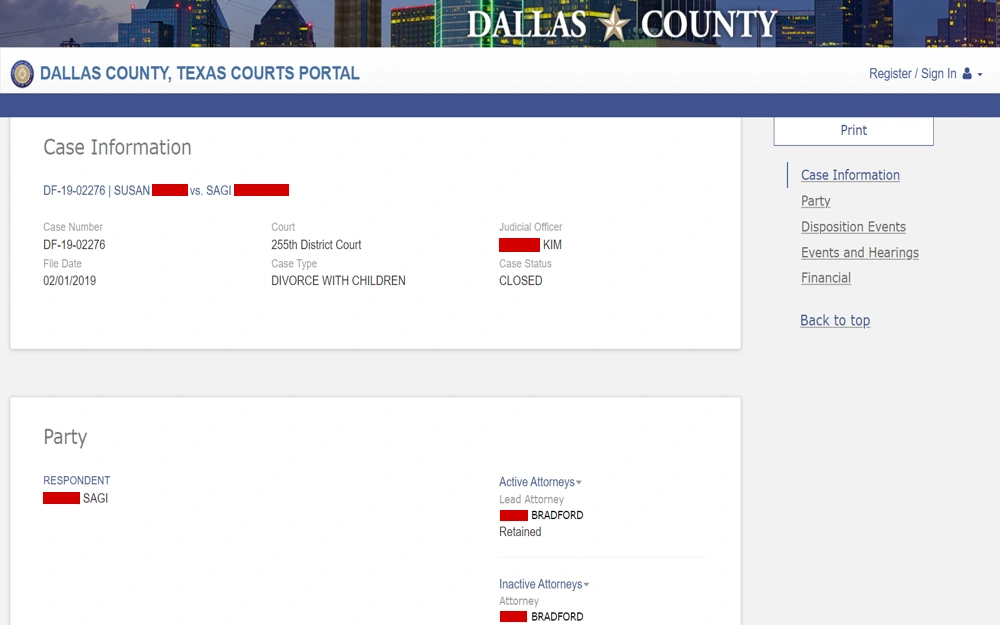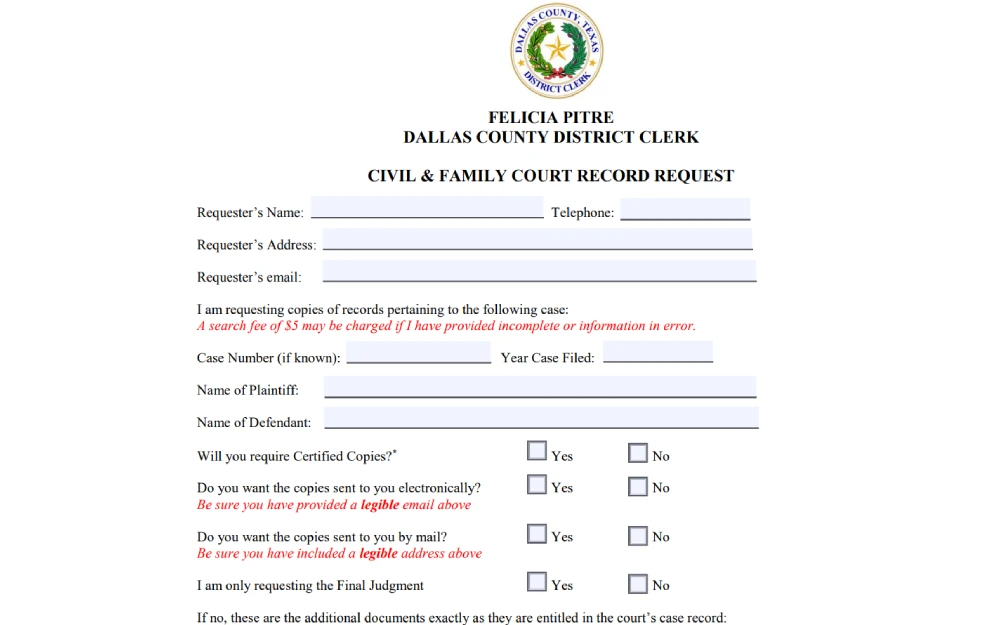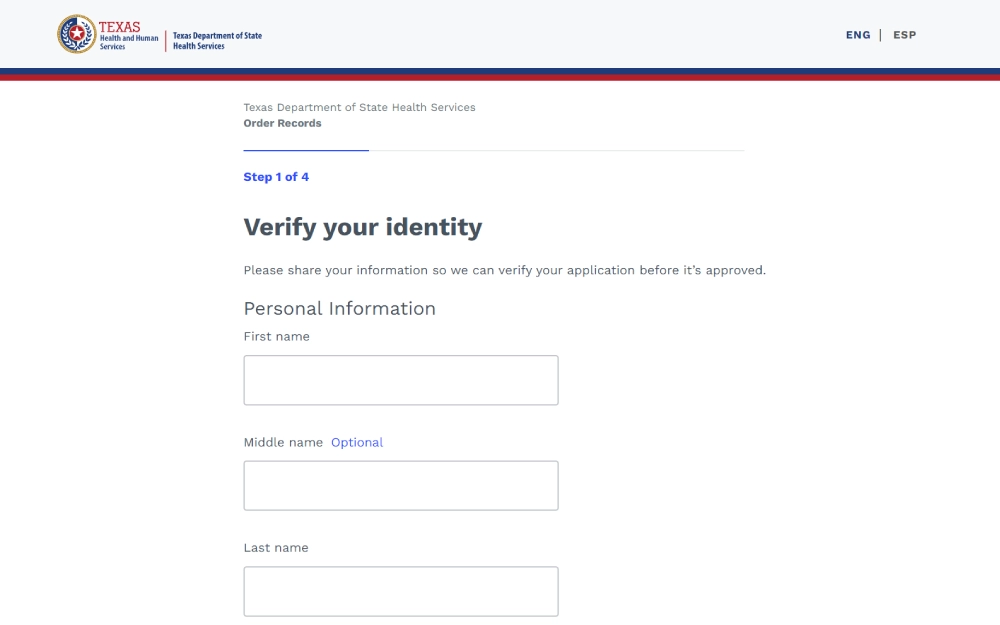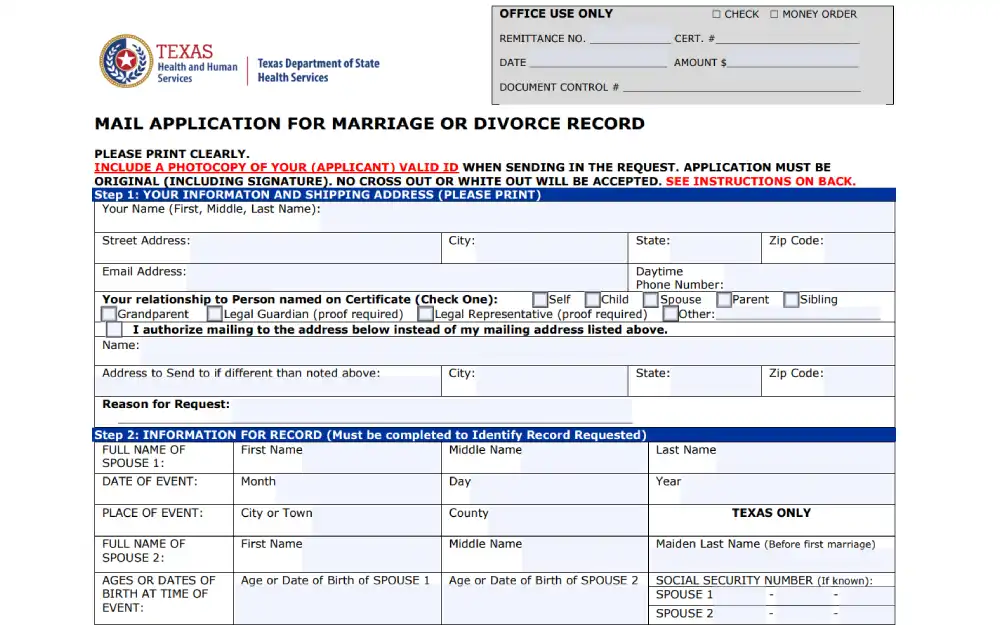Find free Dallas County divorce records in no time using this step-by-step resource.
Divorce records are considered public information; anyone can inspect them for any reason. The Texas Public Information Act grants citizens the right to access this information. However, it does not dictate how government agencies must make this information available. As a result, the process can vary from one agency to the next, and it’s important to know which offices host divorce information.
This resource links and explains the tools you need to successfully look up divorce records in Dallas County, Texas.
This resource was written by Attorney Robert Bailey Jr, who holds a Juris Doctorate from Widener University School of Law.
How To Access Dallas County Divorce Records at No Cost
There is more than one way to access public divorce records. However, there is only one record custodian of divorce documents, and that is the Dallas County District Clerk.1 One option for a citizen to access divorce records is to use the Dallas County District Clerk’s Online Record Search Portal.2
To use this tool, start by clicking on the “Smart Search” option. Unless you have the case number to target your search results, select the advanced filtering options. Under the “location” option, choose to filter by District Court Family cases.
You can then enter the person’s name you want to search. If you are not sure how to spell their name, spell it out phonetically and check the “sounds like” option.

If you are searching for a common name, you may want to filter your search results further. You can do this by selecting the case status and setting a date range for when the divorce case was filed. The summary results of any matching records will provide you with the party name, file date, status and court location.
The results will also provide you with the case number, which you can click on to obtain the complete online record.
For the complete online record, the first thing you will see is the case summary. As you scroll down, you can view party information, including any attorneys providing representation for the case. The next section is the disposition events, which will tell you how the divorce case was resolved and when it was finalized.
A citizen can also view a list of all events and hearings that occurred throughout the divorce case. Lastly, you can view any financial information related to the divorce case.
In some situations an individual will have a need to provide official proof of a divorce. When that’s the case, a person can make a request for a certified divorce record. To request a certified (or non-certified) record in Dallas County, you can complete the Civil & Family Court Record Request Form.3

On this form, you will be required to provide the case number (if available), the year the case was filed, and the party’s names. You will also provide your own contact information.
On the form, you will indicate whether you want certified records or just informational copies. You will also indicate how you want the records delivered.
A certified record will cost $1.00 per page, regardless of how it is delivered. There may be an additional $5.00 search fee if the information provided is incomplete. If you are sending your fee by mail, you can do so with a check or money order made payable to the Dallas County District Clerk.
The completed request form can be sent via email to [email protected]. You can also mail or bring the form in person to the address below:
Dallas County District Clerk
Attn: Civil & Family Court Records
George Allen Courts Building
600 Commerce St., Ste. B-30
Dallas, Texas 75202
If you need additional assistance with obtaining a divorce record, you can contact the District Clerk by phone at 214-653-7307. The District Clerk is open for phone and in-person inquiries from 8:00 AM to 4:30 PM, Monday through Friday.
In some cities, a local government agency is another option for accessing divorce records. Similar to other counties in Texas, the Dallas County District Clerk is the sole custodian of divorce records. As a result, there is no city government agency that can provide this type of information.
How To Track Down Divorce Records Throughout All of Texas via the Department of State Health Services Vital Statistics Section
In your searches of divorce records in Dallas County, you may have trouble finding a particular document. It’s possible that the person you are searching for was divorced in a different county in Texas.
To try and figure out which county they were divorced in can be a time consuming process. Instead, consider searching with a statewide resource.
Searching through a divorce index is a great option if you are looking for free information to track down the dissolution of a marriage in Texas. The Vital Statistics Section of the Texas Department of State Health Services provides a yearly index with this vital information, starting in 1968. This information, provided by the district courts throughout Texas that have issued divorces, is available to anyone.
While indexes do not provide the entire record, there is some valuable information you can gather. First, they provide the file number and the names of both parties to the divorce. You can use this information to perform a more detailed search at the county level.
The indexes also provide the date of divorce, the county where it occurred, and the number (if any) of children the couple had together that were under 18 at the time of dissolution. You can even see how old the two parties to the marriage were when they got divorced. For more information, you can send an email to [email protected].
Through the Vital Statistics Section, you can also request a verification of a divorce letter.4 A verification letter is official proof of the divorce of two individuals in Texas. While this does not provide the same details as a decree or divorce certificate, it does provide confirmation of the divorce, along with the date and county from where it was issued.
A divorce verification letter is not available to anyone who asks. This type of request is limited to the people listed on the record as well as a few limited family members such as a spouse, parent (or guardian), child, grandparent or sibling. A legal representative or person with a court order can also receive a divorce verification letter.
If you are a qualified person, you must also have certain information at your disposal. Specifically, you will need to know the names of both parties to the divorce, when it occurred and the county that was responsible for issuing the decree. If you have their age at the time of divorce or social security number, this information will be helpful as well.
In addition to data about the couple, you will have to provide your own contact information. You will then have to indicate what qualified relationship you hold with the people listed on the record to make a request.
If you are qualified and have the required information, you can submit a divorce verification letter request online.5 Alternatively, you can complete a paper Application for Divorce Record and mail it or drop it off at any local office that accepts these types of requests.6, 7 If you are going to mail it in, send the application and fee to the address below:
Texas Vital Statistics
Department of State Health Services
P.O. Box 12040
Austin, Texas 78711

Common law divorce records can also be requested since Texas recognizes common-law marriages. This is where two parties never went through the formal marriage process but are now recognized as married in the eyes of the state.

If you have additional questions about requesting a divorce verification letter, you can call them at 888-963-7111. The Vital Statistics Section is open Monday through Friday, from 8:00 AM to 4:00 PM.
Are Divorce Records Publicly Accessible in Dallas County Texas?
In Dallas County, divorce information is accessible to the general public. The rights to access divorce records are fairly broad and are afforded through Texas’ Public Information Act.8 The Public Information Act gives citizens the right to both inspect and copy these divorce records.
There are a variety of divorce records, and while they are all generally available to the public, you may find that some records require additional steps before you obtain them. At its most basic level, a person can generally view divorce papers and other documents contained within the divorce record. This can include document filings and general divorce data.
However, certain documents may require additional steps, such as the following:
Certified Divorce Record: If you need official proof of a divorce, you will need a certified record. Unlike an informational copy (i.e., non-certified record), a certified record can be used for various business or legal reasons, such as changing your name on your passport or driver’s license.
Divorce Decree: This document is the official order that establishes two people as divorced. The decree will also contain the requirements of both parties to the divorce, such as how assets will be divided and any monthly spousal or child support payments.
There are also exceptions to the availability of some divorce records in Dallas County. For instance, a judge can seal a record on a motion from a party to a divorce case. However, the party has a high burden of proving that the release of the information would be harmful and its restriction would not have a negative impact on the public’s right to access information.
In addition, certain sensitive information can be restricted by a court while allowing the remainder of the divorce record to be available for general viewing. Sensitive information could be personal identifying information like social security or driver’s license number.
There are options if you find yourself unable to find a particular divorce record. One option is to reach out to a third-party provider that can track down any hard-to-find divorce records. You may be unable to find a divorce record for a variety of reasons, including not having the correct county where the parties were divorced.
When using a third-party provider, do not rely on them to provide you with anything more than informational copies of a record. Only a government-approved third-party vendor can provide you with an official record.
You should now be able to distinguish between the various types of Dallas County divorce records; you can use that understanding to target your search for the specific information you need.
References
1Dallas County District Clerk. (n.d.). Contact us – administration. Retrieved December 29, 2023, from <https://www.dallascounty.org/government/district-clerk/contact-us-administration.php>
2Dallas County District Clerk. (n.d.). Courts portal. Retrieved December 29, 2023, from <https://courtsportal.dallascounty.org/DALLASPROD>
3Dallas County District Clerk. (n.d.). Civil/Family records request form [PDF document]. Retrieved December 29, 2023, from <https://www.dallascounty.org/Assets/uploads/docs/district-clerk/Civil-FamilyRecords_RequestForm.pdf>
4Texas Department of State Health Services. (n.d.). Marriage & divorce records. Retrieved December 29, 2023, from <https://www.dshs.texas.gov/vital-statistics/marriage-divorce-records>
5Texas Online Vital Record Application System. (n.d.). Order divorce verification letter. Retrieved December 29, 2023, from <https://ovra.txapps.texas.gov/ovra/order-divorce-verification-letter>
6Texas Department of State Health Services. (2022, February). Marriage and divorce verification form [PDF document]. Retrieved December 29, 2023, from <https://www.dshs.texas.gov/sites/default/files/vs/doc/marr-div-verification-wedding.pdf>
7Texas Department of State Health Services. (n.d.). Order records locally. Retrieved December 29, 2023, from <https://www.dshs.texas.gov/vital-statistics/order-records-locally>
8Texas Comptroller of Public Accounts. (n.d.). Public Information Act. Retrieved December 29, 2023, from <https://comptroller.texas.gov/about/policies/open-records/public-information-act.php>
